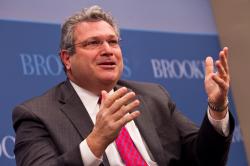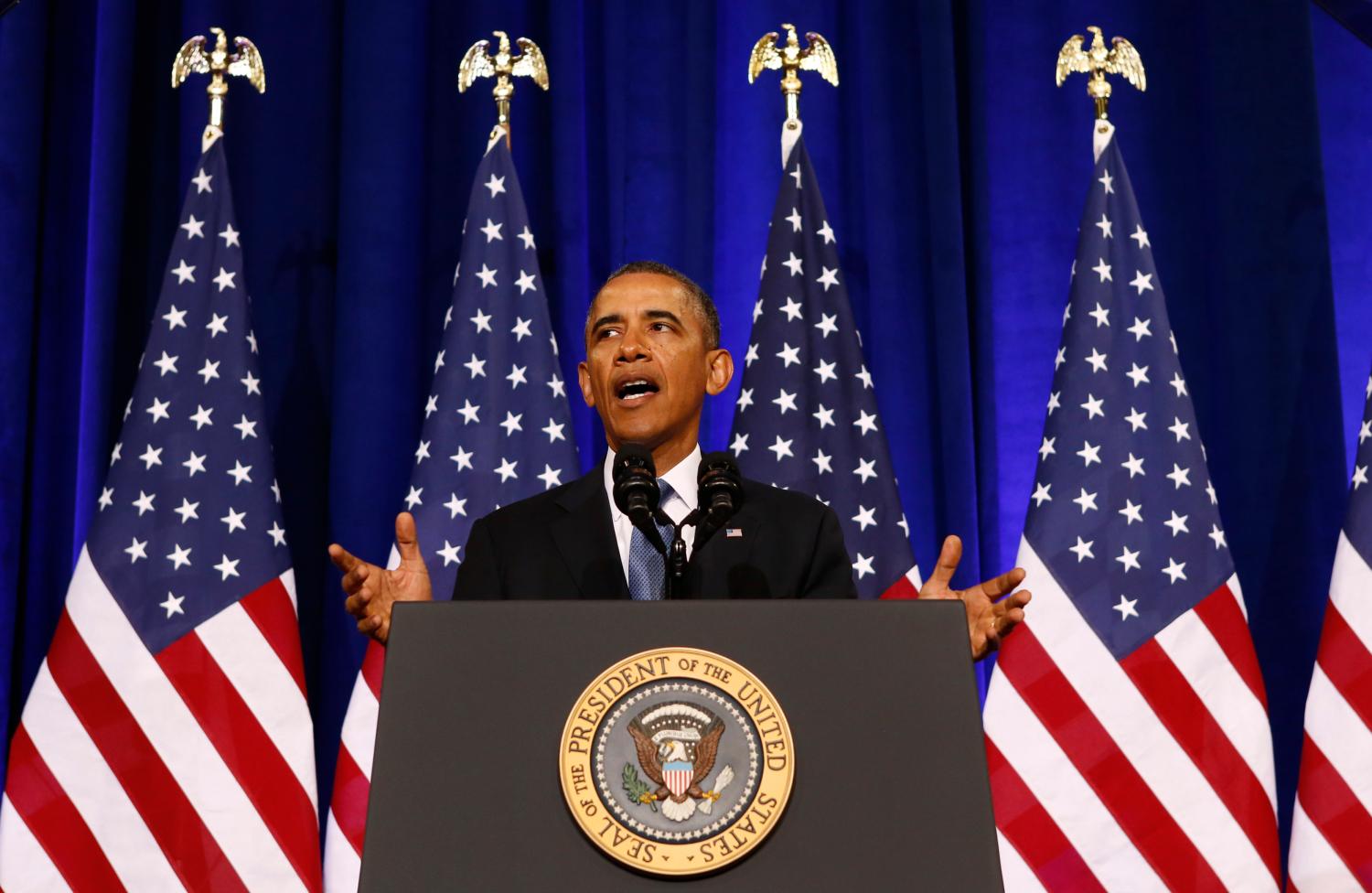President Obama’s overarching foreign policy goal in the remainder of his second term should be to reassert American leadership in a rules-based international system, write Robert Kagan and Ted Piccone. The president also needs to lead at home, reminding Americans why continued vigorous engagement in the world is in their best interests.
 |
MEMORANDUM TO: President Obama |
Summary and Recommendations
In the year since Brookings published its first Big Bets and Black Swans report, the global situation has become more unstable and America’s role more uncertain. The concerns we expressed then about the fraying of the liberal order, and the need for strong and effective American leadership to reverse that trend, remain. At home, Americans grow more uninterested and disillusioned by foreign policy, as indicated by the November 2013 Pew poll. Cuts in defense, foreign aid and other spending related to foreign policy continue to mount, even as the American economy shows increased signs of vitality and even though foreign challenges are increasing. Although cautious optimism may be warranted in some areas—the possibility of a deal on Iran’s nuclear weapons program, for instance—by most indicators, the world has become a more difficult and dangerous place since you began your second term.
Your overarching foreign policy goal for the remainder of your term should be to reassert American leadership in a rules-based international system in which norms are not only articulated but also, wherever possible, enforced. This will require doubling down on some big bets—rebalancing in Asia, rolling back nuclear weapons development in Iran and North Korea, winning trade and investment agreements in the Pacific and Atlantic zones, and investing in our national human and physical capital and global reach. You will also need to limit damage from the turmoil in the Arab world, shore up our key alliances with Germany, Japan and Korea, and manage any provocations from Russia and China.
Background
The plastic moment of a year ago to mold the global order is slipping away as crises become more complicated. In the Middle East, the situation in Syria has grown more dire, despite some progress toward controlling and eliminating the government’s chemical weapons program. Among the Syrian opposition, al Qaeda and other extremist factions have grown in strength and influence as more moderate groups continue to founder, partly as a result of inadequate outside support and direction. The steady flow of refugees across Syria’s borders increasingly threatens the well-being and stability of neighboring countries. The vast number of displaced persons within Syria may this winter turn into an even greater humanitarian disaster. The continuation of the proxy war, which some of your advisors favor, seems likely to create a nightmare scenario for the United States and our allies in the region: a significant al Qaeda presence, and a major cross-border humanitarian crisis, with the possibility of further destabilization in the region.
In Iraq, meanwhile, sectarian and terrorist violence is on the upswing and state security forces are losing ground to al Qaeda. In Egypt, hopes for progress toward democracy have been dashed by the military coup and the subsequent disenfranchisement and persecution of supporters of the Muslim Brotherhood and also, increasingly, liberal and secular voices. The growth of violent radicalism in both Iraq and Egypt, together with the crisis in Syria, poses significant challenges to American interests in a more secure region.
In Asia, doubts about American staying power persist, despite the announced “rebalancing.” Regional allies question whether continuing political gridlock in Washington, limits on defense spending and America’s evident continuing preoccupation with the Middle East have made the so-called pivot to East Asia more rhetoric than substance. China’s provocative new policy of seeking to control extended airspace, and ongoing tensions between our allies Japan and Korea, could pose an escalating threat to American credibility.
Among the greatest challenges facing American foreign policy may be public attitudes at home. According to the most recent Pew poll, 52 percent of Americans believe that the United States should “mind its own business internationally and let other countries get along the best they can on their own.” That is the first time in the 50 years Pew has been asking this question that a majority of Americans have expressed this view. While some movement in this direction was probably predictable given the difficulties in Iraq and Afghanistan, the trend ought to be worrying to those who believe the United States must continue to play an active role in the world in order to protect its interests and values. In the 1920s and 1930s, the downward spiral of public support for international involvement proved very difficult to reverse when real and dangerous threats emerged.
In short, global ambivalence about the United States and its role in the world is matched at home by similar ambivalence if not disinclination to play a significant role. This may be producing a self-reinforcing tendency toward less and less effective American participation in a world that remains full of dangerous challenges.
How to turn things around? The good news is that the present trend is not irreversible. Contrary to what the public has now fully absorbed as the conventional wisdom, the United States is not in decline but may be in the early stages of a significant economic upturn. While the economies of the BRICS slow or stagnate, the American economy is enjoying stronger growth than expected. The shale gas revolution promises to boost the economy further, and our companies lead the global revolution in technology.
You can both strengthen and capitalize on these developments by doubling down on efforts to negotiate the Trans-Pacific Partnership (TPP) and the Trans-Atlantic Trade and Investment Partnership (TTIP). These will require a much bigger domestic political effort than your administration has made so far, both to persuade the public of the advantages of global free trade and to gain congressional trade promotion authority. The payoffs of these trade agreements, however, will be enormous, not only in the boost they would give to the American economy but in shoring up the liberal economic order which has served to protect American interests and more broadly has produced a more peaceful and prosperous world. It is also time to play offense in the global debate on regulation of the Internet by protecting it from those who seek to restrict access and leading by example through serious reforms of our own policies.
Complementing the restoration of American leadership in the global economy, we also need a reassertion of American leadership in the strategic realm. This will require active American engagement in both East Asia and in the Middle East and North Africa. In East Asia you need to double down on showing America’s commitment to regional security and stability. This means ensuring that sequestration or any alternative budget agreement does not damage U.S. military readiness and capabilities in the western Pacific and does not undermine the planned deployments as set forth in your rebalancing strategy. Successful negotiation and passage of the TPP will help strengthen the image of an America that is deepening its engagement in a rules-based system.
In the Middle East the challenges are greater. Many of our allies in the region are already beginning to operate on the assumption that the United States is withdrawing its power and influence. This is leading them to take matters in their own hands in ways which are unhelpful and detrimental to our interests and the interests of regional peace. One big step in reversing this trend would be a deal that successfully limits and then ends Iran’s nuclear program. Such a breakthrough would lessen regional tensions considerably and open up opportunities for progress on other fronts, including a broader dialogue with Iran concerning both domestic and foreign policies. You must also be prepared, however, for an unsuccessful negotiation, which would further diminish American influence and credibility unless you take steps to shore up the international sanctions regime and deter efforts by Iran to cross the nuclear threshold.
In Syria, your present course may be leading to one of the worst-case outcomes your administration has sought to avoid: an increasingly powerful jihadist force battling a determined and brutal dictator with no moderate alternatives and with the Syrian population the victim. A strategy that aims at the status quo will fail. Change is inevitable, and the only question is whether the United States wants to try to influence the direction change takes. Over two years ago, you declared that “Assad must go.” That should continue to be your medium-term goal, and our strategy toward Syria ought to be aimed at achieving it. This does not require the insertion of ground forces into Syria. It does require arming, training and advising those elements of the opposition who are not jihadists and coordinating the efforts of our allies in the region. You should also continue to push hard on all parties, including Russia, to find a political settlement that will allow immediate delivery of humanitarian assistance and accelerate a transition to a post-Assad regime that excludes militants.
Conclusion
In short, there is still time for you to steer the United States toward a more active and engaged role in the world, one that would benefit both Americans and those who share our values. Some past presidents have accomplished a great deal in the last two years of their second term, President Ronald Reagan negotiated a landmark arms control treaty with the Soviet Union; Bill Clinton used force effectively to avert a humanitarian disaster in Kosovo and shore up the NATO alliance. Similar important breakthroughs remain possible. To take advantage of these opportunities, however, and to avert possible disasters that lurk over the horizon, will require the kind of leadership, energy and focus that only a president can provide.





